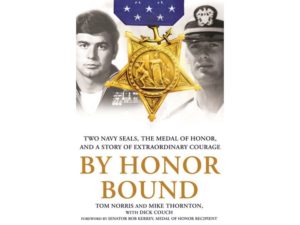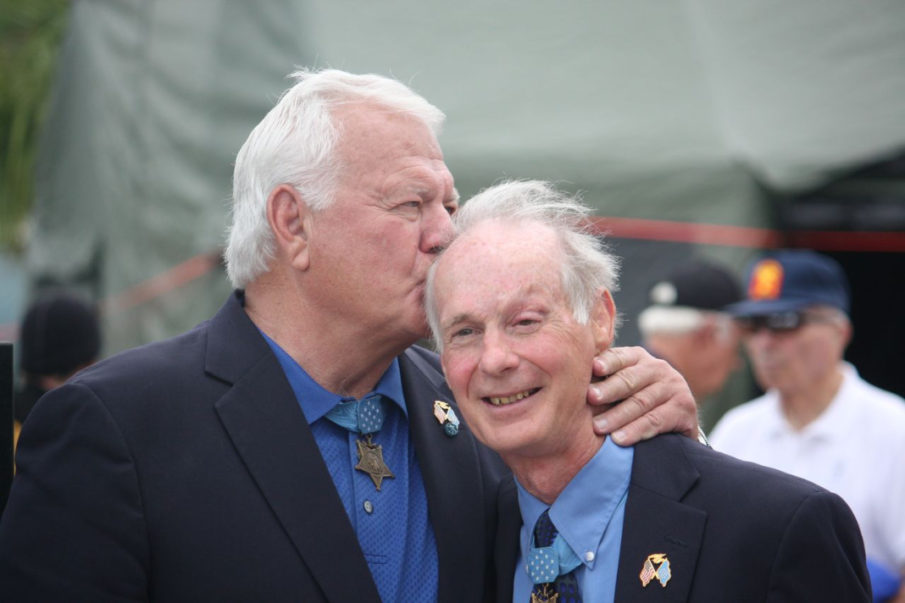Growing up the son (and nephew) of a Navy SEAL, and deciding early on to follow that same path, there are some men that stand out as giants in the imagination of this author. As a kid, my father would share with my brother and me stories of the Vietnam-era Navy SEALs. They were “the men with green faces,” the ones who collectively built the reputation of the SEAL Teams through their blood, heroism, and relentless and ferocious action in the Vietnam War.
My dad knew (and knows) many of those men well, even though he never served with any of them in combat in Vietnam. He completed BUD/S training as the conflict there was winding down. Nonetheless, they were also heroes to him, and he did his duty in passing down to me their stories of incredible bravery and selflessness on the battlefield.
Within that SEAL pantheon, as it existed in the 1980s and 90s, two men stood out a little taller than the rest. Those two men were Mike Thornton and Tommy Norris. As a kid, I knew those names and their exploits as well as — or better than — I did those of Superman and Captain America. They were larger than life, and a big part of why I wanted to become a Navy SEAL.
As I grew up, and eventually became a SEAL myself, their exploits became no less astounding, though they receded into the back of my mind. They were replaced to some extent by the more recent heroism shown on battlefields in Iraq and Afghanistan, by a younger and just-as-impressive generation of SEALs. Many today who may know the names of Mike Murphy, Michael Mansoor, and Ed Byers (the most recent SEAL Medal of Honor recipients) may not have ever heard of Thornton or Norris, or Bob Kerrey. They should learn their names, and they should hear their stories.
Author and former SEAL Dick Couch has helped immensely in that effort, with his most recent book, “By Honor Bound,” released this past May, and co-authored with Norris and Thornton. A review of the book can be found here on SOFREP. Mr. Couch will also be a guest on an upcoming episode of SOFREP Radio, to discuss the book with this author and former SEAL Eric Davis. I am ecstatic to be able to discuss the exploits of these two men with one who knows them both, served with them, and who has so ably facilitated the telling of their tales.
The book is at once a gripping war story — really, two harrowing accounts of heroism in combat — and yet dispassionate and precise in its details. It is without flourish or unnecessary superlative, as it has no need for either. The stories themselves are the stuff of legend. The book is straightforward and matter of fact, which serves to underscore just how incredible these mens’ actions were. Couch appears to have gone to great length to accurately reconstruct the events that occurred, through interviews with the two SEALs, the Vietnamese commandos that accompanied them, and the other military personnel involved in supporting roles.
It is a rare feat when a “war story” can at once aptly illustrate the confusion of battle, the dedication to each other of brothers-in-arms, and the mission focus of ground-level troops, while avoiding commentary on the larger strategic goals of a failed war, and the political agendas involved therein at every level. Mr. Couch has achieved that feat.
Mike Thornton and Tommy Norris were both honored for their actions in the later stages of the war, as it wound down, and as fewer SEALs were present in country than had been there at the height of the conflict. Theirs was largely an advisory role by the early 1970’s, as the SEALs in country sought to train and advise South Vietnamese SEALs in combat operations.
At the time, Norris was tapped to rescue three downed American pilots behind enemy lines, and through sheer force of will and meticulous planning and execution, worked with his small contingent of Vietnamese compatriots to successfully extract two of the pilots alive (one was killed by the Viet Cong).
Norris refused to abandon the downed pilots, even after initial failure, and went behind enemy lines over and over again, using daring, subterfuge, and ingenuity to execute his mission. All the while, he put himself and his Vietnamese teammates at great risk so as to not leave a fellow American behind. It was American special operations at its finest, and will probably be studied for decades to come by those who make it their mission to carry out such operations.
Mike Thornton arrived in country for his second combat tour in Vietnam after Norris had successfully rescued the American pilots. Norris was an officer in charge of a small unit that included Thornton and three Vietnamese commandos, whose mission was to insert over the beach into contested territory to gather intelligence and, if possible, an enemy prisoner. Even at that time, Norris’ rescue operation had become well-known within the SEAL community, and beyond, such that Thornton knew he was working with a distinguished and battle-tested teammate.
The operation encountered difficulties from the start as the unit was erroneously inserted close to the DMZ, the heavily fortified line of separation between the two opposing armies, instead of farther south, as intended. Things got worse from there, as the men eventually found themselves in a ferocious firefight with a much larger North Vietnamese army unit. Norris communicated with supporting naval assets offshore, to acquire naval gunfire support. Meanwhile Thornton and the Vietnamese SEALs killed tens of enemy fighters, one after the other, from their defensive position atop a sand dune.
Eventually, Norris was shot in the left eye, and had a section of his skull blown away, exposing his brain. While thinking Norris was dead, Thornton nevertheless braved enemy fire to recover his (alive) SEAL teammate, then proceeded to swim Norris through the surf zone, and out to sea, along with another wounded Vietnamese SEAL teammate. The men were all recovered by a Vietnamese naval vessel, with a SEAL aboard who had been coordinating the operation. Thornton’s actions were nothing short of extraordinary, and directly resulted in the saving of Norris’ life, and the successful extraction of all members of the team.
Both Norris and Thornton narrate portions of the story, while Couch fills in details and background information about the wider conflict. Both Norris and Thornton represent themselves in a gracious and humble way in the telling of the tale. They were doing their job, executing their mission, and living up to what they had been taught in SEAL training: that you never leave a man behind. Both men give due credit to all of those involved in their operations, including the South Vietnamese SEALs, the naval and air assets in support, and those commanding them from near the action. They recognize and explicitly acknowledge all that went into the efforts in which they were involved.
“By Honor Bound” is a fast-paced, rousing action story, set during a war often depicted as a lost cause, fought by soldiers routinely drunk, high, and reluctant to be there, and often involved in dubious actions against civilian populations. This is not one of those stories. It is an account of the actions of brave and dedicated men in combat, depicting the love and dedication that men-at-arms share for each other. If it were a Hollywood movie — really, two movies — it would almost seem too fanciful, and some would complain that it glossed over the horrors of war. That is far from the case. There was plenty of horror, plenty of fear, and even despair as circumstances worsened during each operation.
Yet, despite all of that, two American Navy SEALs — alongside their Vietnamese brothers — showed what it means to fight with highest honor and distinction.
If there is any justice in the world, these tales will stay with us forever.











COMMENTS